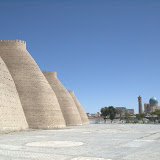
‘For lust of knowing what should not be known,
We take the Golden Road to Samarkand…
What would ye, ladies? It was ever thus.
Men are unwise and curiously planned’
James Elroy Flecker.
While Samarkand has its poetic place in the history of Empire, Bukhara– just down that golden road and a famous Silk Road trading post – has its own bloodthirsty tales of political intrigue. The language of colonial imaginings and tales of derring-do coloured distinctly my notions of this stretch of our cycling odyssey. My prereading (thankyou, Peter Hopkirk) did nothing to dispel the idea that traveling to Bukhara was best done in a caravan of camel traders, in the 19th century and incognito.
The 19th century marked out this region as a pitch to be conquered in the ‘Great Game’ between the Russian and British empires, the ultimate goals being control of India and access to the markets of the Khanates scattered in oases of inhospitable deserts. Skipping over several centuries of migration and conquest by various nomadic tribes, the powerful Khanates at this point were Khiva, Kokand and Bukhara. Documented visits by outsiders had been few and far between since the 16th century, when regular trade routes last flourished.
On this background, the exploits of a few daring individuals, both British and Russian, who took on the task of opening up trade and political links here seem outrageously romantic and dangerous. A plethora of disguises – merchant, holy man, beggar – and a facility for languages and knowledge of local customs and the arts of flattery seemed prerequisites for the job. As did a profound sense of destiny – whether it be the rightfulness of the ascendancy of the British/Russian Empire, the export of Christianity or even the realization of personal glory.
 |
| From Travel 2010 sub |
The Emir of Bukhara in the mid 19th century, Nasrullah Khan, was not known for tolerance and fair play, having ascending to the throne by means of murdering his brother. Upon reaching the walls of his citadel in 1839 in order to give assurances of neutral British intent following one of the occupations of Afghanistan, Colonel Charles Stoddart committed a bit of a faux pas. Not only did he arrive without a letter from Queen Vic herself, he changed from his disguise into military regalia and rode his horse inside the city walls. For a non-believer, this was definitely a no-no.
He may have had much time to ponder this in the three years or so that he spent in a nearby pit filled with all varieties of vermin. He was joined there in 1841 by Captain Arthur Conolly, who came to negotiate his release. Unfortunately, there was little political will at home to risk an incursion into the area and potential war with Russia in order to rescue the unfortunate pair. The following year saw the British thoroughly routed in Kabul, and perceiving a weak nation in these two, the Emir had them dragged into the forecourt (Registan) in front of the Ark and executed.
 |
| From Bukhara |
Another few decades and another Emir later, the Russians finally succeeded in making a vassal state of the Bukhara Khanate in 1868. Shortly after the Russian Revolution, reformists within Bukhara had sought support from the Bolsheviks. Being obliging types, they sent in the Red Army to bomb the place into submission and add to its dilapidated charm. The Soviets did add in other ways, though, for example vastly reducing rates of pestilence by draining the city's ancient and renowned canals and reservoir pools used for ritual bathing.
Though our own curious plans meant that we did not enter this city’s crumbling outer walls walking our trusty steeds, we did sample another of the historical realities of empire and conquest in these parts. The Trans-Caspian Railway which carried our travel-weary bodies to these distant parts was commenced at the watery end in 1879 and skirted hundreds of kilometers of desert and mountain ranges to reach Bukhara and Samarkand by 1888. It allowed the Russian Imperial Army to keep its military control in the region and sufficiently spooked the British. Mission accomplished. Eventually linking with European and Russian networks, it allowed massive exports of cotton from the area continuing into the 20th century.
 |
| From Bukhara |
The historical charm of the city is these days somewhat packaged for the coach tours and the domed mosques have been restored to shining perfection, though it does retain its baked-brick charm in the winding back streets and courtyards. Foreigners are welcomed in a variety of languages – French appears to be the language of choice this year – and a disguise would only be necessary to protect you from the not-too persistent vendors of rugs, paintings and Soviet-era memorabilia. Times have changed, and for the casual tourist the ravages of history, Empire and a modern one-party state have brought some benefits.
 |
| Bukhara |



0 comments:
Post a Comment